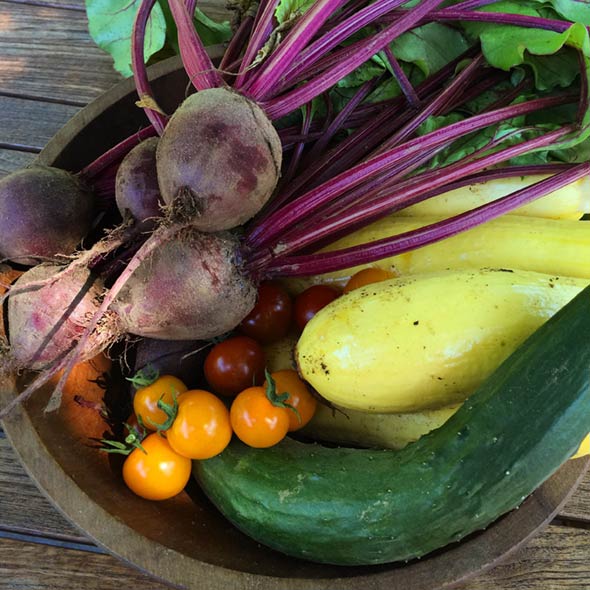
I don’t have a lot to say today. This post is more about bragging. (“Really, you’re going to brag, Leite? Is that how Momma Leite raised you?” I can hear you all thinking.) [Editor’s Note: I hate to be the one to tell you this, but this is not the first time David’s been a braggart.] Come on people, cut me some slack. I just harvested our first cucumber from our garden this morning—the first cucumber I’ve ever planted. Plus I pulled our very first beets ever out of the earth. What an extremely satisfying experience. They practically popped out themselves.
When I worked on Mr. Silvia’s farm when I was a kid, he never planted beets, so I never understood how they grew. In fact, this morning, my heart sank when I saw the tops of them cresting the soil. “Damn it,” I thought. “I screwed up again.” But before I did what I wanted to do, which was to yank each and every one of those suckers out of the ground and hurl them into the woods, I read up on them. They’re supposed to crest. It’s called “bulbing up.” I left the other 60 or so plants in the ground, right next to the carrots I’m desperate to pull out and take a peek at.
However, all is not glorious in Jardim de Leite e O Um. (That’s Portuguese for the Garden of Leite and The One.) We have tomato blight, which I had to battle with shears dipped in a bleach solution and then a spray of baking soda, vegetable oil, and water. And the basil plants, which until this year never took hold much, are practically shrubs. The problem? Japanese beetles. Plus the summer squash, cantaloupe, and watermelon have encroached on the pepper plants. We’re desperately trying to get the creepers to weave up the fence and away from the other produce. Stay tuned.
Yet through it all, I’m already designing next year’s beds and contemplating extending the garden by half. I am just so freaking proud of myself. (I know, I know, there I go bragging again.)
UPDATE
Well, I’m not bragging now. Our beets tasted very earthy, hardly sweet at all. Anyone have any ideas? They’re Detroit Reds.
If you’re looking for recipes for your bounty, try these
Beet and Carrot Fritters
Hibiscus Beet Sorbet
Roasted Cherry Tomatoes
Tomato and Goat Cheese Cobbler
Israeli Pickles
Japanese Cucumber Salad












Anne has great advice, start with the nurturing soil.
All I was going to suggest is keep them in a bag on the counter for a few days to ripen/sweeten or create recipes with maple syrup, agave or brown sugar.
Gardening is so nurturing, enjoy!
Thanks, Randi K. I checked the soil, which is organic and amended with compost, and it was 7.0 ph. Perfect for beets and carrots. I like your idea of letting them sit on the counter for a few days. We have never had the opportunity to eat a beet right out of the ground, so maybe they all taste earthy then. So I’ll give your experiment a shot.
David, I’m curious, was the soil just recently amended with compost? And by “recently,” I mean just before you planted your veggies? What I’m learning as I begin to understand how to garden here in the southwest is that it takes time for soil and its amendments to sorta jive, you know? So while the dirt could immediately measure a perfect pH of 7 and be an environment in which things will grow, it may just take a while for things to get to the point where they become truly harmonious. Shrug. That’s what I’ve been told. Just a thought.
No, Renee. It was amended over the past year at the organic farm. A small side note: I plucked those beets a week or so before the appointed time, according to Burpee. (I misread my calendar.) So I wonder if that had anything to do with it. We just ate the remainder of the beets, which were larger, and they were a bit sweeter. So we’re going to see how it goes next week when we harvest more.
You may need to add potassium or some other mineral to your soil. Detroit Reds should definitely be sweet, not earthy. Best to get your soil tested. Your local Cooperative Extension office can test your soil sample for pH and nutrient levels (some states charge a small fee). The soil analysis usually takes a few weeks to get back to you. The analysis includes detailed results and suggested amendments specific to your region.
Thank you for that, Anne. I have a ph test, which I will do today. But I’ll have the soil tested by out local offices. Thanks!
You can make some awesome krauts with beets, as I’m sure you know. Also, I just watched this old episode from the PBS show, A Chef’s Life, that shows an awesome secret technique for pickled beets, at minute 3:30.
El, I really appreciate this! I usually cut the greens about 5 inches from the beets, which they say also prevents the bleed out.
Those beets are simply gorgeous! Roasted beets? Tart? Fritters? Salad? What will you be making and when should my fork and I arrive?
They will be roasted, Cindi. Come over whenever!